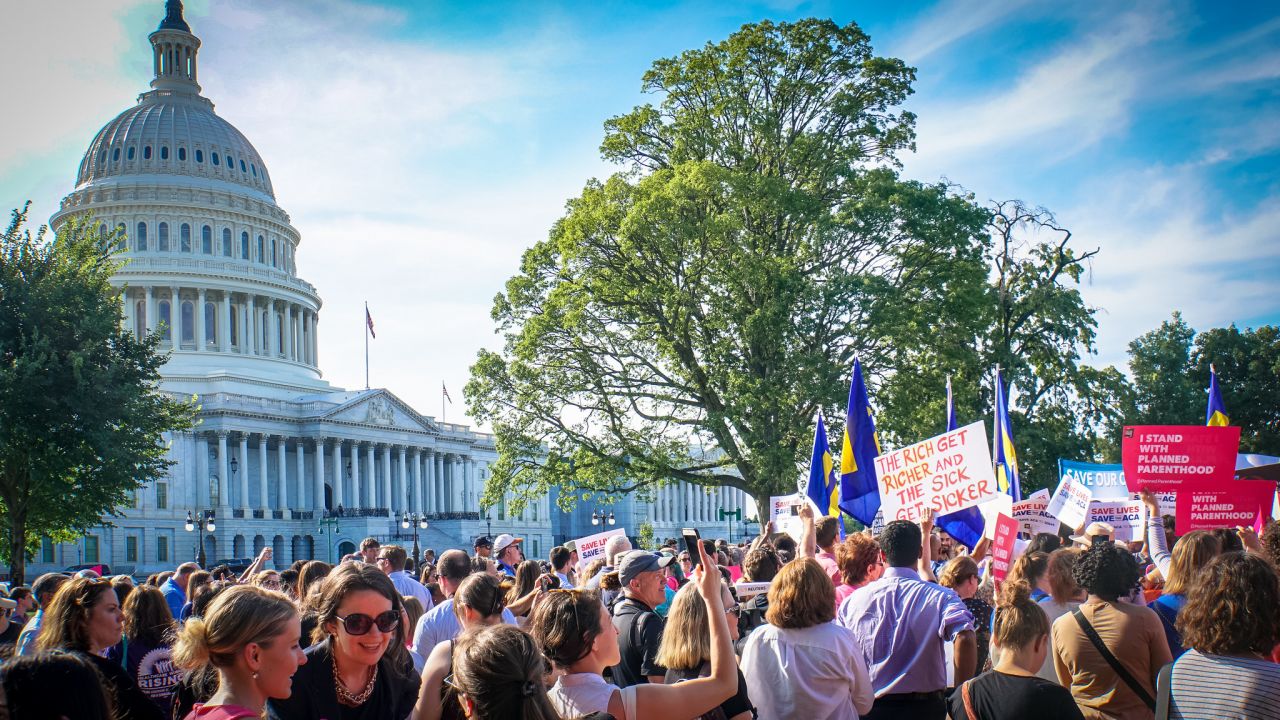
Citizens and leaders gather at the US Capitol to support quality health care for all. (Photo by Ted Eytan | Flickr CC 2.0)
This post first appeared at OurFuture.org.
In Friday’s early morning hours, news outlets had their spotlights trained on Sen. John McCain (R-AZ), casting him as the decisive player in the latest health repeal drama.
When McCain walked to the front of the room, flagged the clerk, and gave a thumbs down, reporters immediately dashed out of the gallery to pound out stories about the “maverick” move.
It was a dramatic moment, in a dramatic week, in a dramatic presidency. It’s the kind of political theater that sells newspapers and keeps 24-hour cable pundits in business.
The Real Story
But the most important parts of the story have little to do with the dramatic gestures of the senior senator from Arizona, who largely objected to the bill for procedural reasons, rather than the fact that it would kick tens of millions of people off health care to give tax cuts to billionaires. And despite their more-principled opposition, the real story isn’t really about Sen. Susan Collins (R-ME) and Sen. Lisa Murkowski (R-AK), either.
No. It’s that people from all walks of life, in small towns and big cities, in red districts and blue, have waged a historic effort. We’ve stood up for ourselves and for our families, friends and neighbors who would be impacted by health care repeal.
We’ve stood side-by-side to say that we should be a country that cares for one another, not one where we take health care from seniors, push the disabled into dilapidated institutions or let the poor die in the richest country on earth.
Republicans have waged a seven-year battle to repeal the Affordable Care Act. Since August of 2009, they’ve used the law to stir their base into a frenzy. No wonder that since the election they’ve made it the centerpiece of their legislative agenda, going so far as to promise to repeal it on day one.
Millions Speak Out
But in the last six months, millions of people have showed up at marches and rallies, spoken out at town halls, put their electeds on speed dial, and bird-dogged them from fundraiser-to-fundraiser. We’ve derailed the Republican agenda again. And again. And again.
While some of this activity has been spontaneous, spurred by righteous indignation at legislation that puts tax cuts for billionaires above health care for families, it is also a testament to grass roots organizing.
Many of the same organizations that have been working to reform the health care system for decades, and that worked tirelessly to pass the Affordable Care Act, have played a crucial role in training and mobilizing everyday people.
This includes groups like People’s Action and more than 20 of our state-based organizations, but also dozens of groups cooperating under the banner of Health Care for America Now, labor unions such as SEIU, and digital advocacy organizations like MoveOn.
A crucial feature of groundswell we’ve seen since the election, the so-called “Resistance” movement, is that it’s been a big-tent movement to derail the Republicans’ ability to govern on a broad array of issues — not just health care.
Quickly puncturing the idea that the Republicans’ sweeping victories in a deeply flawed electoral system was accompanied by any kind of popular mandate, it knocked the wind out of some very puffed up sails.
But in December, just weeks after the election, organizers put in place an infrastructure to channel energy from the grass roots into confronting what we knew would be the Republicans’ chief legislative priority.
The fundamentals of our strategy have been deceptively simple: delay and divide.
Why We Fight
We didn’t know if we could defeat the repeal effort — indeed, we still don’t know if we ultimately will — but we are certain that if we slow it down we can work to prevent disastrous policy proposals and delegitimize the Republican Party’s ideas.
We also knew that right-wing polarization over the last decade has created deep divisions within their party. Our goal has been to peel off ideologically moderate or electorally vulnerable Republicans, knowing that the far-right will also peel off votes from the other direction. This strategy has enabled us to fracture the Republican’s governing coalition in both the House and the Senate.
Our organizations have worked night and day with hundreds of thousands of politically engaged people to generate a huge volume of activity aimed at realizing this strategy.
People’s Action and our state-based member organizations alone have organized more than 638 rallies, 105 lobby meetings in congressional offices, and hundreds of thousands of phone calls, letters, and petition signatures. And we represent just one part of this broader movement to save our health care.
Tactics That Win
In addition to the sheer volume of our activity, we engaged in four key tactics. First, we engaged Republican governors in states that had the most to lose from the repeal effort, urging them to speak out against it.
Second, we worked directly with rural voters around issues that matter most in their communities. Third, we focused not only on pre-existing conditions and raising premiums, but also on Medicaid, a program that serves more than 70 million people.
Most importantly, we worked day in and day out with families who have benefited from the Affordable Care Act and have the most to lose from repeal, elevating their stories. This was crucial to putting the narrative about health care back on track.
After all, health care should be about helping real people thrive, not about line items on a budget or mitigating liability to bolster profits. By sharing those stories, we recentered the debate around making sure our health care system works for the people who rely on it: us.
Working Together
By working together, our movement has fundamentally redefined the terms of the health care debate and reshaped the political terrain on which Republicans are trying to legislate. What happened Friday night, happened because of us — the people — not the politicians huddled in the dead of night to decide just how many people in this country should lose their health care.
This fight isn’t over, by a long shot. Already over the weekend, Trump took to twitter to bully more members of his own party and threaten to sink the health care exchanges. Sen. Lindsey Graham is testing support for a new repeal bill. And Republicans are gearing up for major fights on the budget and taxes that could gut Medicaid, privatize Medicare, and give away billions of dollars in tax cuts to drug and insurance corporations and the ultra-wealthy.
But today, we fight with new confidence. When we stand together, when we fight smart, we can win. The Republicans have shown us that they have no ideas of their own for how to reform health care. But we do. The path forward is to take health care out of the market and make it available to every person in this country as a human right.
Now’s The Time
Now is the time to put forward bold solutions that drive in that direction. Democrats should put forward legislation that lowers the Medicare age, expands Medicaid, creates a public option in every state, and requires the government negotiate lower prescription drug prices with drug corporations.
They should shorten the length of prescription drug patents and allow people to import prescription drugs from abroad. And any legislative agenda or party platform with a chance of leading Democrats to victory should include Medicare-for-all.
We’ve spent the last six months fighting against a president and a party that are bound and determined to attack our communities at every turn. Now is the time to fight for the world we need.




